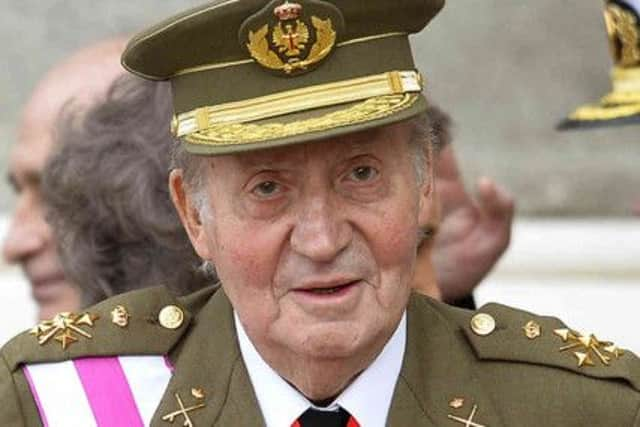Juan Carlos, King of Spain, to abdicate


The king told Spaniards in a nationwide address that he started making a plan to give up the throne after he turned 76 in January.
He said that the 46-year-old Crown Prince Felipe – whose 70 per cent approval rating in a recent El Mundo newspaper poll compares to his father’s 41 per cent – is ready to be king and will “open a new era of hope”.
Advertisement
Hide AdAdvertisement
Hide AdJuan Carlos did not specify which problems his son must address, but the king stressed Felipe will need to “tackle with determination the transformations the current situation demands and confront the challenges of tomorrow with renewed intensity and dedication”.
As Spain embarks on what appears to be a sluggish but steady economic recovery, its biggest problem is the drive by the wealthy northeastern region of Catalonia to hold a secession vote in November – one labelled illegal by the central government in Madrid.
Now that Felipe is set to become king, Spain is expected to change its constitution. The royal family has said its wants the change to ensure Felipe’s older daughter Leonor is next in line to the throne in the event that his wife gets pregnant again and gives birth to a boy, who would become monarch under the current constitution.
Analysts say that could open the door to political negotiations for additional proposed constitutional changes, including demands by the leading opposition Socialist Party to grant Catalonia more autonomy or special financial benefits to ease Catalonian separatist feelings.
The abdication was first announced yesterday by the prime minister, Mariano Rajoy.
He did not say when the handover would happen because the government must now craft a law creating a legal mechanism for the abdication.
Juan Carlos has been on the throne for 39 years and was a hero to many for shepherding Spain’s democratic and economic transformation, but has had repeated health problems in recent years.
His long-standing popularity took a big blow following royal scandals, including a 2012 elephant-shooting trip he took in the middle of Spain’s financial crisis during which he broke his right hip and had to be flown from Botswana to Spain aboard a private jet for medical treatment.
Advertisement
Hide AdAdvertisement
Hide AdThe king’s image was also tarnished by the investigation of his son-in-law, who is suspected of embezzling large amounts in public contracts. In January his daughter Princess Cristina was forced to testify in the fraud and money-laundering case targeting her husband Inaki Urdangarin, an Olympic handball medalist turned businessman. She became the first Spanish royal to be questioned in court since Juan Carlos took the throne. In his speech the king did not mention any of the scandals, played down his health issues and praised the crown prince.
“My son Felipe, the heir to the throne, embodies stability,” Juan Carlos said.
Felipe would presumably take the title King Felipe VI. He has a law degree from Madrid’s Autonomous University and obtained a master’s in international relations from Georgetown University in the United States.
Felipe is married to Princess Letizia, a former television journalist. Their daughters are aged eight and seven.
King Juan Carlos came to power in 1975, two days after the death of longtime dictator Francisco Franco.
He endeared himself to many Spaniards, in large part by putting down an attempted military coup in 1981 when he was a young and largely untested head of state.
He was also a stabilising force in a country with restive, independence-minded regions like Catalonia and the northern Basque region.